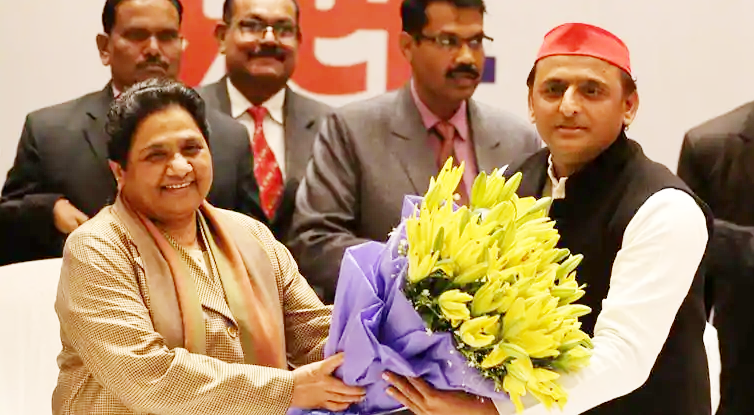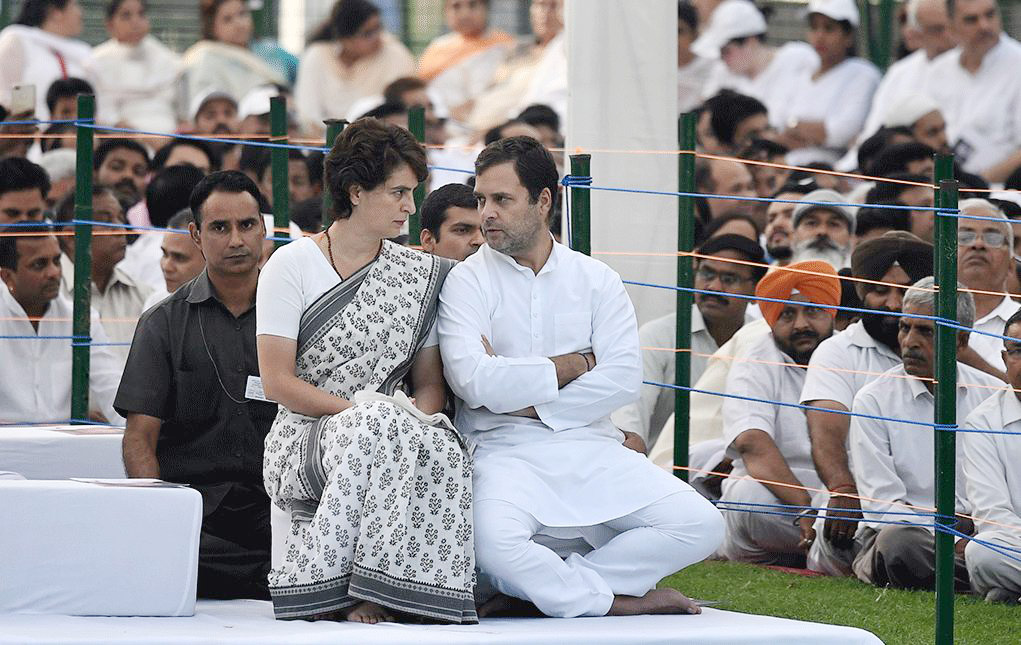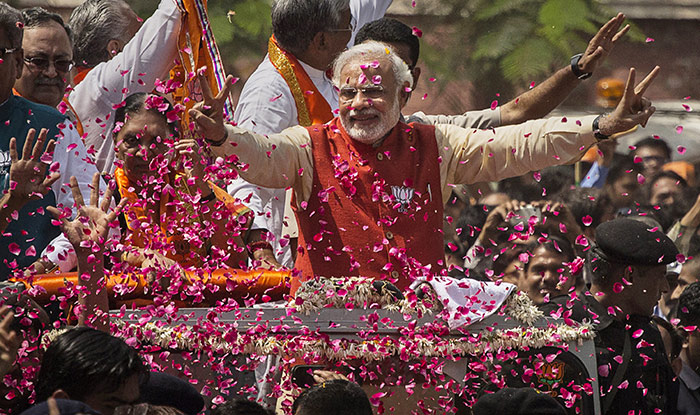TOUGH: At the grass roots levels the aam aadmi seem to be impressed by Modi’s tough stand against Pakistan and opted for a strong leader. The working class including farmers do not understand the absurdity of Modi claiming clouds will protect the fighter aircraft from Pakistan radar and guns
By Sayantan Bera
Even before results were declared psephologist and TV anchor Yogendra Yadav described how the Congress was ambushed by the BJP. The BJP was perhaps right in saying that the Congress only bothered about the Khan market set and did not get the support of the huge lumpen classes who were more impressed with Modis claim of being a strong leader
Several days before the exit poll results began hitting the airwaves, noted political scientist Yogendra Yadav had already read the tea leaves and it had begun to look increasingly saffron. With its national security pitch, the Bharatiya Janata Party (BJP) effectively ambushed the 2019 general elections, says Yadav, who is also the president of Swaraj Abhiyan.
For a variety of reasons — from a lacklustre Opposition campaign to the BJP’s organisational machinery, money, and media dominance—the election is coming to a close amidst a sense of inevitability, he says. “To my mind, it is quite clear that (Prime Minister) Narendra Modi is headed for a second term,” he says.
But he warns that while the Congress’ past blunders might have fuelled the BJP’s dramatic rise on the Indian political landscape, the saffron party’s cultural and social dominance may end up becoming much worse than the Congress’s hegemony of the 1980s. The Congress may have won huge electoral majorities in the ‘80s, but they never had raw street power or the backing of large cultural organizations, he says. If enough Indians aren’t watchful, including those who preferred the BJP for a variety of reasons, then, he warns, India could easily head towards electoral authoritarianism — a regime where elections take place at the appointed hour, but everything other than elections that a democracy needs does not exist.
(Edited excerpts)
Q. How do you think India has voted?
It is foolish to hazard a guess, but since there is no law against foolishness, let me say what I think is the writing on the wall. To my mind, it is quite clear that Narendra Modi is headed for a second term. The specific calculus may vary — it could be a clear National Democratic Alliance (NDA) majority but not a BJP majority, which is the most likely. It should not be hard to guess why the numbers may add up this way. My own sense is that the BJP is not losing more than 30 to 50 seats over what they had last time (282 Lok Sabha seats) and the Congress is unlikely to more than double what they had in 2014 (44 seats). The broad composition of how these numbers will stack up is almost clear. The BJP might end up gaining something like 30 seats in the East — from Odisha, (West) Bengal and the North-East. This gain will be enough to take care of any marginal losses the party will suffer in the rest of India outside Uttar Pradesh (UP). So, in a sense, whatever the losses of the BJP in UP would be its net loss in the country.
Q. So, how do you think UP may have voted?
UP is one state where I would have liked to have some detailed exit polls (data) before I speak with some certitude, so what I say is subject to correction. We all know that beginning with 71 seats, the BJP can only lose seats in UP. We also know that the Samajwadi Party (SP)-Bahujan Samaj Party (BSP) alliance is formidable enough to reduce BJP seats by half. Now, there are two questions. Whether the alliance will be able to bring its votes fully together. Second, whether they will create a buzz and get some additional votes, which is what great alliances do, when two and two become five. The third minor but significant question is whether the Congress can act as a spoiler. To my mind, hardcore supporters of the SP-BSP seem to have voted for the alliance, but we still don’t know whether both the alliance partners have worked to their full capacity.

In a good election, the SP could get something like 75% of the Yadav and Muslim votes and the BSP could get 85% of Jatav and 60% of other Dalit votes. Have they tapped into that much or transferred all of it? I am not sure. Has Mayawati’s base among non-Jatav Dalits eroded further? Have the Muslims not been distracted by the presence of the Congress? If we see that the alliance did not deliver to the extent to which it was expected to, then these will be the underlying reasons. One thing we can say without hesitation though. In the whole of north and west of India (the area where the BJP swept in the 2014 polls), except Punjab, UP is the only place where the party is facing a serious resistance. But this resistance has come on the basis of caste and community arithmetic, not on the basis of ideological or agenda. Being able to offer an alternative dream, being able to convince voters of an alternative vision is altogether different. That did not happen in UP, and it could be one of the reasons why this historic alliance may not achieve what it potentially could.
Q. So the nationalism pitch worked for the BJP in UP?
It is only fair to acknowledge that this almost turned the elections all over the country, not just in UP… even down to Karnataka. What Balakot (retaliatory airstrikes in Pakistani territory) did was it foregrounded the question of kaun banega pradhan mantri (Who will become the prime minister)… a question that was receding into the background. It forced people to think: If not Modi, do you want (Congress party president) Rahul Gandhi. In an election where the BJP would have contested defensively, it provided them with a narrative.
By February, there were questions that the BJP found almost impossible to answer—on the farmers’ front, on employment, and, increasingly, on Rafael and corruption. It is not that people completely forgot those issues, but in a state of mind where an ordinary voter was willing to suspend disbelief, Balakot provided them with just the excuse necessary to do so. We should, of course, ask why were voters in that state of mind—that will take us to the state of the Opposition.
Q. How would you rate the Opposition campaign against Modi?
The Opposition Congress and its allies looked amateurish, if not childish, in the way they handled the campaign. The Opposition and the BJP’s campaign belong to two different universes. The BJP had access to unlimited resources and the quiet backing of the Election Commission. They had Modi, the organisational machine, the money, and the media which played into the hands of the ruling party. These four M’s were so powerful. And the BJP exhibited a will to power which you rarely find in politics. The manner in which (BJP president) Amit Shah can strike a deal with the Shiv Sena — short of personal abuses, there is nothing that the Sena has not done against the BJP — or to strike a deal with the Asom Gana Parishad (AGP) which had almost called them anti-national, or to have the kind of coalition in Bihar where it decided to retire its sitting members of Parliaments (MPs).
In comparison, the Opposition campaign was a joke. They had no message. Above all, they did not have a messenger. They had no master plan. The Congress and the Aam Aadmi Party (AAP) which had no MP in Delhi could not come to an understanding. It is not quite clear what was the Congress trying to do by putting Rahul Gandhi in Wayanad (Kerala) when they were also hoping to court the Left. Congress’ manifesto was far superior to the BJP’s but a manifesto is not a message to the voter sitting in a remote corner of this country. I almost felt that writing serious and responsible manifesto is not a political virtue. In these elections, where the challenge was to create a wave and come to power, they produced such a nice, responsible, correct, proper, duly audited piece of document that I almost felt angry about. This was not a political document you take to the people to change their mind.
Rahul Gandhi showed many virtues in this election. He showed a certain tenacity. He exuded energy. He did not sink to the level to which Modi did, but the one thing that he needed to do was this: carry conviction to the people… Here is the message. I will do it. Look into my eyes, I mean business. As (former US president) Ronald Reagan used to say: “Read my lips.” That’s what he needed to do. Ultimately, it is the lack of credibility of the Opposition which made all the difference.

Q. What was at stake in this election?
This has been, in many ways, an extraordinary election. When the election began, there were many like me who felt that the stakes were very high… that this was probably the third most important election in the history of India. The first was 1952, which decided whether India could go ahead with universal adult franchise or not. 1977 decided whether India will remain a democracy or not. This election, I said, was about whether India remains India or not. Fifty years from now, a future historian would wonder why what was at stake in these elections was never really discussed. How the election actually managed to bypass what was really at stake. In a sense, what we have witnessed is a perfect ambush. Following the Pulwama terror attacks, what Modi’s team designed was a classic dodge, distract, derail (scheme). They created so much mist, so much dust… by the time the dust settled, the game was over. This is where the BJP used its propaganda machine, money and media muscle power… and the Election Commission let that ambush take place.
Unless something is dramatically wrong in my assessment, it is an ambush that has succeeded. In any election, there is always a gap… a misalignment between what voters intend to do and the real consequence. For the voter, this was a low choice election where they probably said: “Okay, Mr Modi has not done what he said he would do and I can’t quite trust him to tell me the truth, but on balance, who is better than him? Maybe, the fellow deserves one more chance.” So, intentions are very limited, endorsement is almost conditional, but the outcome can be staggering. The outcome can be something which can change the future history of this country for a very long time to come.
Q. What do you fear?
I feel we are entering a long and dark tunnel. I am not given to paranoia, but I think we would be fooling ourselves if we do not acknowledge the consequence of a BJP victory and Mr Modi’s return to power. What will be perceived and presented as popular endorsement… the consequences will be deeply damaging for our republic. I almost feel that this election will contribute to the beginning of the dismantling of our republic, and the tragic thing is that the public can be mobilized to dismantle a republic. To put it more specifically, if Mr Modi forms the government, we would see a very serious erosion in whatever remains of the quality of our democracy. We would be taking many steps towards what can only be described as electoral authoritarianism, which is to say, a regime where elections take place at the appointed hour but everything other than elections that a democracy needs does not exist. In elections, the counting is fair, but nothing other than counting is fair.
We have already seen a serious erosion in the quality of institutions, from the Central Vigilance Commission and the Central Bureau of Investigation to even the Supreme Court. We have seen the Rajya Sabha being bypassed in many occasions. I fear that with this election, we are staring at not just a loss of autonomy but a situation where a duly elected leader exercises all the powers of an authoritarian regime—where there is a concentration of constitutional power in the hands of the central government, concentration of the state power in the hands of a political party, and concentration of political party in the hands of one person. We are looking at a situation where electoral success will be the measure of everything. Elections taking place at an appointed hour will be the single source of legitimacy. Once you have an election, why bother about anything else. I have the mandate, I have the people with me. This is classic populist authoritarianism.
We are looking at a BJP hegemony which is stronger than the Congress hegemony of the 1980s. The Congress’s hegemony was based on massive electoral victories. But that is only one component. The second component is brute and effective use of state power to silence everyone… in a way in which leaves no dark corners. You capture everything from a school teacher to a rickshaw-wallah, the syllabi to the national security apparatus. The third component is raw street power. Fourth is cultural and ideological hegemony which the Congress did not enjoy in the 1980s. The BJP may be the first party in the history of India to exercise its hegemony through all four components.
Our liberal intelligentsia is unwilling to recognize that the BJP has managed to shift the centre-point of popular imagination. The things some in the party say about Muslims, which appear vulgar to us, enjoy a resonance among the public, and their capacity to control the cultural agenda is very deep.
So, it seems that party, government, nation, and religion are merging into one identity in popular imagination.
That is what we are walking into. These distinctions (will) cease to exist. Constitutional governance is all about creating distinctions and marking boundaries and authoritarian regimes are all about erasing these distinctions.
India was born in a state of turmoil. Later came the Emergency years. Many said India will fall apart. Don’t you think it has enough resilience?
India is an impossible experiment that worked. No one in the 1950s gave India a chance to hold together as a nation. There were moments during the Emergency when everyone thought democracy has all but being folded up. So, yes, I am not saying the dream is lost forever. All I am saying is this is a very serious setback, even worse than the Emergency, which was an onslaught only on one of the pillars of the idea of India—democracy. The other two pillars, diversity and development for the last person, were sort of left untouched.
I do not believe in some magical hand of self-resilience, but we do have concrete things left on the basis of which to mobilize. We still have the Constitution, our biggest gift. The cultural agenda of the BJP’s majoritarianism runs against the grain of everyday practices in this country. We have deep cultural resources — (Guru) Nanak, Kabir (Das), Tukaram. We have great and deep traditions. We have the entire legacy of India’s freedom struggle which stands against what Mr Modi represents today. I do feel that because this (electoral) endorsement is not so unquestioning, there will be a vast reservoir of unease and disquiet which Mr Modi may not be able to manage. Youth and unemployment, even more than farmers, could be the biggest problem for the new government.
If I could respond rhetorically, this regime has most things, but its detractors will still be left with three assets—the soil of this country, the Constitution and (Mahatma) Gandhi. In that sense, the darkest moments also present the biggest opportunity. These are moments that await the heroes and heroines of history.
Courtesy: Livemint
